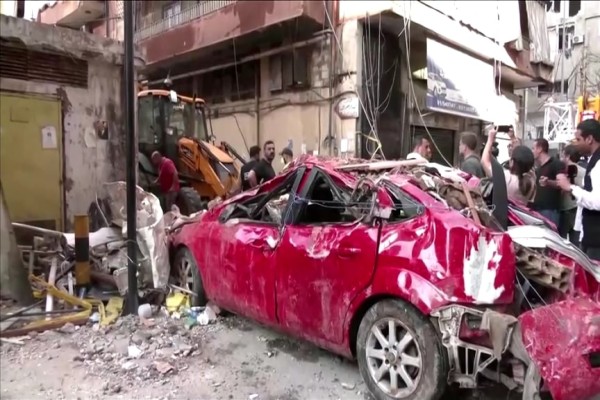An Israeli airstrike on Beirut killed a senior Hezbollah commander on Tuesday as cross-border rocket attacks by both sides increased fears of a full-fledged war in the Middle East.
Israel’s military said the airstrike on the Lebanese capital killed Ibrahim Qubaisi, the commander of Hezbollah’s missile and rocket force. Two security sources in Lebanon described him as a leading figure in the Iran-backed group’s rocket division. The attack, in which six people were killed, dealt another blow to the Iran-backed group which has faced a series of setbacks at the hands of Israel over the past week.
Israel’s military later said the air force also conducted “extensive strikes” on Hezbollah targets across southern Lebanon, including weapons storage facilities and dozens of launchers that were aimed at Israeli territory.
🚨 Breaking: Israeli Air Force successfully eliminates Ibrahim Mohammad Qubaisi, Hezbollah’s head of rocket and missile command, in a precise strike in Beirut today. Qubaisi was a key figure behind the rocket attacks on Israel and a central player in Hezbollah’s military… pic.twitter.com/mxN7k8x0ze
— Asaf Givoli (@AsafGivoli) September 24, 2024
“Hezbollah today is not the same Hezbollah we knew a week ago. (It) has suffered a sequence of blows to its command and control, its fighters, and the means to fight,” Israeli Defence Minister Yoav Gallant said, adding the strikes would continue. “These are all severe blows,” he told Israeli troops.
Lebanon reported 569 people had been killed and 1,835 wounded since Israel launched heavy strikes on Monday morning, including 50 children, Health Minister Firass Abiad told Al Jazeera Mubasher TV.
Hezbollah said it launched rockets on Tuesday at the Dado military base in northern Israel and attacked the Atlit naval base south of Haifa with drones, among other targets. The Israeli military said sirens sounded in the early evening in the northern city of Safed, where Dado is located, and nearby areas.
It did not say whether the base was hit.
Israel’s new offensive against Hezbollah has stoked fears that nearly a year of conflict between Israel and the militant Palestinian group Hamas in Gaza could destabilise the Middle East.
At the U.N., U.S. President Joe Biden sought to calm Mideast tensions. “Full-scale war is not in anyone’s interest, even if a situation has escalated, a diplomatic solution is still possible,” he told the 193-member U.N. General Assembly.
Israel is shifting its focus from Gaza to the northern frontier, where Hezbollah has been firing rockets into Israel in support of Hamas, which is also backed by Iran.
Israel wants to secure its northern border and allow displaced residents to return. This has set the stage for a long conflict, while Hezbollah has said it will not back down until a ceasefire is reached in Gaza.
Meanwhile, Israel’s Ambassador to the U.N. Danny Danon said Israel was open to ideas for de-escalating the conflict in Lebanon. “We are not eager to start any ground invasion anywhere… We prefer a diplomatic solution,” he told reporters.
The Israeli military said it found ammunition in Lebanese people’s homes. Israel has accused Hezbollah of hiding its weapons in homes and villages in Lebanon, allegations the Lebanese group denies.
Several airstrikes near Beirut tonight. #Lebanon pic.twitter.com/8AbCi3cdwP
— FJ (@Natsecjeff) September 24, 2024
‘A VERY DIFFICULT WAR’
Israel struck the Hezbollah-controlled area of Beirut for a second consecutive day. The Lebanese health ministry said at least six people were killed and 15 wounded when a building in the Ghobeiry neighbourhood of Beirut was struck.
Lebanese environment minister Nasser Yassin said 27,000 people were registered as displaced by the bombing campaign launched by Israel on Monday.
“We felt as if we were in a war, a very difficult war,” said Rima Ali Chahine, 50, speaking at a makeshift shelter for displaced people at a Beirut college.
The casualties and the intensity of the attacks by the most powerful and advanced military in the Middle East have spread panic in Lebanon, but also defiance among people who recall the devastating Israel-Hezbollah war in 2006.
“We are waiting for victory, God willing, because as long as we have a neighbour like Israel, we can’t sleep safely,” said Beirut resident Hassan Omar.
White House national security adviser Jake Sullivan told MSNBC that he believed “a path forward” could still be found to de-escalation and a diplomatic solution.
The fighting has raised fears that the United States, Israel’s close ally, and regional power Iran, which has proxies across the Middle East – Hezbollah, Yemen’s Houthis and armed groups in Iraq – will be sucked into a wider war.
(REUTERS)
















